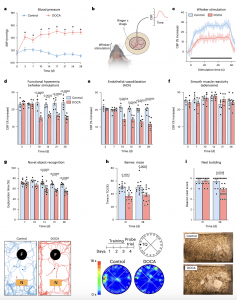Recent research has described a potential link between the response of immune system cells surrounding the brain and cognitive decline associated with chronic high blood pressure (Figure 1). This discovery marks a significant step towards understanding ways to counteract the cognitive effects of elevated blood pressure.

Figure 1: The neurovascular and cognitive impairment induced by DOCA is mediated by IL-17. a, Serum IL-17 elevated in DOCA HTN starting at 10 d (P < 0.0001; one-way ANOVA and Bonferroni’s multiple-comparison test; n = 5–18 mice per group as shown). b, Then, 21 d of DOCA-salt increasing Il17a mRNA (unpaired, two-tailed Student’s t-test, n = 11 mice per group). c, Representative images of IL-17-GFP cells in the small intestine of control and DOCA-salt. Scale bar, 300um. d, 21 d of DOCA-salt also increases IL-17-GFP cells in the small intestine (unpaired, two-tailed Student’s t-test, n = 5 and 6 mice per group). e–g, Cells identified by flow cytometry as T H17 cells (f) and γδT17c cells
(g) in the lamina propria (LP) (e) not intraepithelial lymphocytes (unpaired, two-tailed Student’s t-test, n = 6 mice per group). h,i, TH17 cells (h) and γδT17 cells (i) also expanded in peripheral blood mononuclear cells (PBMCs) and spleen (SP), but not in the bone marrow or lymph nodes (LNs) (unpaired, two-tailed Student’s
t-test per organ, n = 7 and 8 mice per group). j–n, IL-17-deficient mice (KO) (j) not exhibiting an attenuation in functional hyperemia (HTN, P < 0.0001; genotype, P = 0.0024; interaction, P = 0.0002; two-way ANOVA and Bonferroni’s multiple-
comparison test; n = 6–8 mice per group as shown) (k), endothelial vasodilatation (HTN, P < 0.0001; genotype, P = 0.0079; interaction, P = 0.0004; two-way ANOVA and Bonferroni’s multiple-comparison test; n = 6–8) (l) and no deficits observed in either novel object recognition (HTN, P < 0.0001; genotype, P = 0.2603; interaction, P = 0.0003; two-way ANOVA and Bonferroni’s multiple-comparison
test; n = 9–11 mice per group as shown) (m) or Barnes maze tests (HTN, P = 0.0010; genotype, P = 0.0076; interaction, P = 0.0114; two-way ANOVA and Bonferroni’s multiple-comparison test; n = 9–11 mice per group as shown) (n). Data are shown as mean ± s.e.m. Schematics were created with BioRender.com.
Understanding the role of immune signalling in cognitive decline is pivotal. These findings offer crucial insights into how immune system signalling might contribute to cognitive deterioration, a condition often leading to diagnoses of dementia.
Hypertension affects over a billion individuals globally and can significantly impair cognitive function, even in the absence of a stroke. However, treatment efforts targeting cognitive decline in non-stroke individuals through blood pressure reduction have yielded mixed results.
In a mouse model emulating common hypertension, researchers observed heightened levels of interleukin-17 (IL-17) in the cerebral spinal fluid and brain tissues. IL-17, a chemical involved in activating the immune system, was found to exert its effects within the brain, particularly stimulating immune cells associated with inflammation and infection response, known as macrophages.
Through specialized mice displaying fluorescent green IL-17-producing cells, scientists confirmed the increase of IL-17 in the dura mater (protective covering of the brain), which subsequently seeped into the tissue. This penetration of IL-17 into the cerebral spinal fluid indicated a disruption in the brain’s protective covering, the meninges, normally designed to prevent such infiltration.
While IL-17 did display some effects on blood vessels, its major impact arose from meninges-released IL-17 influencing immune cells within the brain. The immune cells, activated by meninges signalling, were identified as the primary contributors to brain-related cognitive impairment.
These findings spotlight the relationship between hypertension-induced immune responses and cognitive decline, offering a deeper understanding of how immune signalling contributes to cognitive impairments in individuals with high blood pressure.
Journal article: Monica M. Santisteban, M. M., et al. 2023. Meningeal interleukin-17-producing T cells mediate cognitive impairment in a mouse model of salt-sensitive hypertension. Nature Neuroscience.
Summary by Stefan Botha
